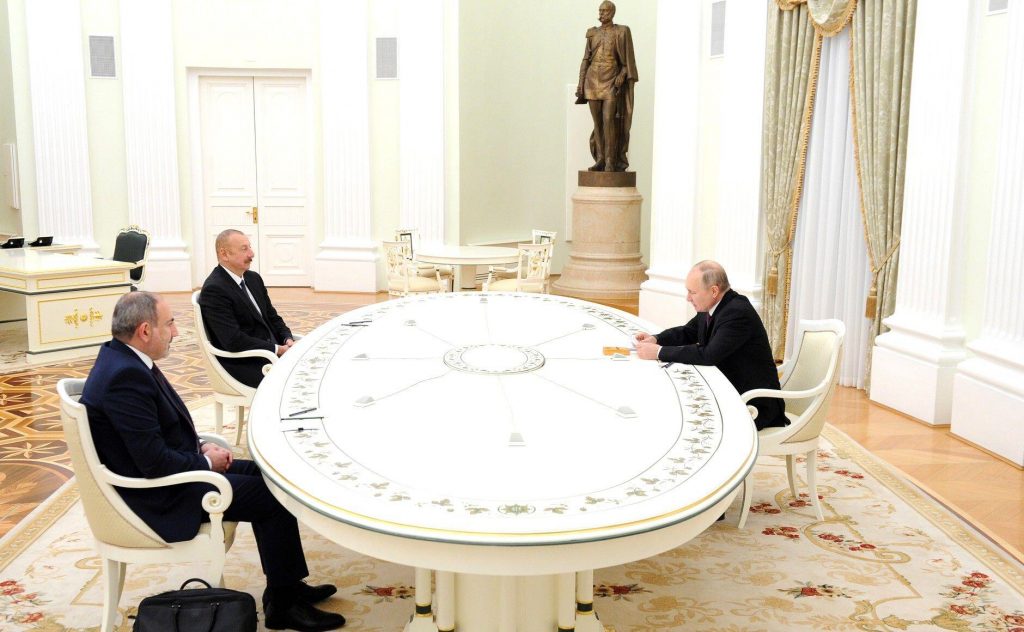
Azerbaijan announced the release of eight Armenian prisoners of war following a virtual meeting with the leaders of both ex-Soviet states, French President Emmanuel Macron and European Council President Charles Michel.
“The release by Azerbaijan and reparation to Armenia of eight Armenian detainees is another sign of positive developments” Michel tweeted after the February 4 four-sided talks. The European Union, he said, “supports stability and prosperity in the region”.
Azerbaijani President Ilham Aliyev and Armenian Prime Minister Nikol Pashinyan held two summit meetings late last year – one hosted by Russian President Vladimir Putin in the Russian Black Sea resort of Sochi and the other by the EU in Brussels.
Both Moscow and Brussels have played an active role in helping the two states forge a durable peace after two wars – including a 44-day conflict last year in which Azerbaijan made major advances to “deoccupy towns” that had been held by ethnic Armenians since the first war in the early 1990s.
Paramount among the issues to be tackled and resolved are demarcation of the joint border and the establishment of trade corridors running through parts of both countries.
Though the 2020 conflict was ended by a Russian-brokered cease-fire and the deployment of 2,000 Russian “peacekeepers” to sensitive areas, limited outbreaks of violence still punctuate the border districts.
The eight Armenian prisoners in question had been captured during one such incident on November 16 last year, which left 25 soldiers dead and 12 Armenian soldiers taken prisoner.
The clash was one the deadliest since the cease-fire and reignited fears of another large-scale outbreak of conflict but ultimately failed to derail talks between the two countries which have made considerable progress.
Corridors to improve ties, boost trade
The last few months have seen an uptick in positive signals exchanged between the two South Caucasus nations, particularly around the creation of what Azerbaijan calls the Zangezur Corridor – a transport link passing through Armenia’s Meghri district and enabling the re-establishment of trade and other relations between Azerbaijan and its Nakhchivan exclave bordering Turkey and Iran.
Armenia has recently dropped its opposition to the project – on grounds that a “corridor” would imply extra-territorial status — and is now actively moving forward with it. The move was welcomed by Aliyev, who has long lobbied for it, arguing that the link will be to Armenia’s economic benefit.
The two sides are also expected to work out arrangements for a second link, known as the “Lachin corridor” between Armenia and Nagorno-Karabakh – a district of Azerbaijan with a large Armenian community and the heart of the protracted conflict.
Concessions on Armenia’s part have occurred in parallel with a steady stream of detainee releases by Azerbaijan. Armenia has also provided information on the locations of lethal unexploded landmines in the territory in and around Karabakh now under Azerbaijani control.
According to Azerbaijan’s State Commission for Prisoners of War, Hostages and Missing Persons, this most recent repatriation comes with the expectation that Yerevan must provide Baku with information about Azerbaijani soldiers and civilians killed during the first Karabakh war and presumably buried in mass graves.
Richard Giragosian, Director at the Regional Studies Centre in Yerevan, told the Tribune
that the use of POWs as “diplomatic currency” is a significant part of Azerbaijan’s post-war strategy.
“Azerbaijan has adopted a relatively successful transactional approach designed to extract as many concessions from Armenia as possible,” he said, adding that Baku was “likely to continue to rely on incremental partial prisoner releases over a long and drawn-out time frame.”
On February 7, Macron announced on Twitter that France had sent a plane to pick up the released Armenian prisoners, while Toivo Klaar, the EU Special Representative for the South Caucasus welcomed the exchange as an “important humanitarian gesture”.
